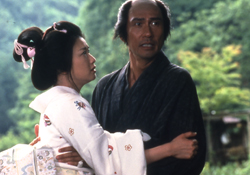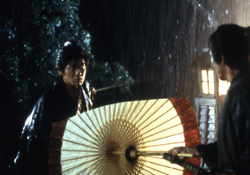WHEN THE LAST SWORD IS DRAWN
- 原題
- 壬生義士伝
- Original Title
- WHEN THE LAST SWORD IS DRAWN
- Production Year
- 2002
- Running Time
- 137min
- Genre
- Action / Drama / Period Drama / Samurai
- Color
- Color
- Director
- Yojiro TAKITA(滝田洋二郎)
- Cast
- Kiichi NAKAI
Koichi SATO
Yuji MIYAKE
Yui NATSUKAWA
Sansei SHIOMI
- Introduction
- Mibugishiden,a film based on the novel by Naoki Prize_winning writer Asada Jiro.
Asada Jiro has written many novels,including Love Letter, Poppoya, Tengoku Made no Hyaku Mairu, Prison Hotel,which were made into films, dramas and plays, and Kinpika, Tenkirimatsu Yamigatari and others made into comics. His works stir the hearts of readers and viewers everywhere, and he is steadily gaining fans.
Mibugishiden centers around the main character, Kanichiro Yoshimura, an obscure member of the celebrated Shinsengumi, which is widely known as a group of patriotic samurai whose duty was to guard and defend Kyoto, the capital of Japan at that time. Kanichiro is the "gladiator" of the group, who is by far the best swordsman among its members, but is also attached to money that his fellow_samurai call him a moneygrubber. He accepts jobs despised by others, takes the money and saves it. His behavior is far removed from the usual image of a samurai. His true purpose, however, lies in supporting his family left behind in his hometown, a far off northern province, and he struggles to the end to survive and provide for his family.The sense of purpose is what keeps him going, and he stakes everything on his motto "Not to die, but to live."
The novel gained wide readership from Bunshun's main 40 to 50 year_old audience. When it was published in hardcover in April 2000, it became a major bestseller with over 250,000 copies sold.
It remains a bestseller even now. - Synopsis
- At the close of the Edo period in Kyoto, among newly recruited members of the Shinsengumi, there is one man who shows outstanding skill as a swordsman. His name is Kanichiro Yoshimura. At that time in the imperial capital, the Shinsengumi, widely known as a group of patriotic samurai whose duty was to guard and defend Kyoto, is making a name for itself as a group of brave swordsmen, but their organization is crumbling from the inside. Hajime Saito, one of the leading figures of the group watches this situation with a cynical eye.
At the welcome reception for the new recruits, Kanichiro boasts about his hometown. Saito is frustrated, and suddenly slashes at him on the way back. Kanichiro dodges and avoids his sword. In anger Kanichiro cries "I cannot afford to die!" Saito losing interest drops his sword. "I kill because I don't want to die" continues Kanchiro. To Saito who is looking for a place to die, Kanichiro appears as a pathetic samurai.
Kanichiro is un-samurai-like in other ways, too. Ordered to assist a hara-kiri, he dispatches the deranged soldier impressively, but then he audaciously begs his captain Hijikata to double his "cleansing" fee. In the last days of the Tokugawa Shogunate, when even the nearest future seems unpredictable, he is diligently striving to make money. However, he has his reasons. Once, while serving as a low-ranking samurai in the Nanbu Clan, Kanichiro was bright enough to work as an assistant teacher in the Clan's school and showed promise for future greatness. However, because of chronic famine in the entire northeastern part of Japan, even samurais were suffering in poverty. To save his own family from starvation, Kanichiro ignored his childhood friend and foreman Jiroemon Ono's advice to stay, and left the domain. He "must live" and miserly save every penny in order send money to his family.
The indiscipline within the Shinsengumi grows worse, not least because of Sanjuro Tani, who is kissing up to the captain and does as he pleases. The situation deteriorates until one day Sanjuro s killed. With keen observation, Kanichiro detects that Saito is the killer, but instead of turning him in, he demands money to keep his mouth shut. Saito takes Kanichiro to his home to give him the money, and there Kanichiro meets Saito's lover, Nui. Saito proudly calls her "ugly" but Kanichiro sees in this Saito's peculiar way of expressing love, and comes to know his good heart.
In the meantime, the breakup of the Shinsengumi is final; Ito and his followers, leave the Shinsengumi to join hands with the Satsuma group, who supports the Emperor and tends to finish the Shogun era. Kanichiro and Saito are invited to join Ito, and while Saito agrees, in order to become a spy for the Shinsengumi, Kanichiro refuses the invitation. He feels it impossible to betray his honor as a samurai for a second time.
Information passes from the spying Saito through Nui to Kanichiro, who in turn must pass it to the Shinsengumi. "I am happy to be useful to Saito," says Nui with a smile. But soon Saito finds out that this has put him and Nui in serious danger, so he orders her to go into hiding. Nui defies the order, but Saito repeats: "I don't want you to die for me. Run!"
A few days later Kanichiro discovers Nui's dead body?she has killed herself. At this sight, he remembers the event that made him leave the Clan: forced by poverty, his own wife Shizu tried to commit suicide. Kanichiro swore to save his family ever since. When Saito returns to the Shinsengumi, Kanichiro softly breaks him the news of Nui's suicide. He knows that despite being reckless and cynical, Saito deeply cared for Nui. Saito coolly dismisses this as none of his concern, but is moved by his compassion.
The conspiracy of the Ito faction to oust the Shinsengumi is revealed; the Shinsengumi goes out to enforce discipline on Ito and fibishes the group. However, it is already too late to stop the collapse of the Shinsengumi. Okita suffers from tuberculosis, Kondo gets shot, and due to the transfer of power back to the Emperor, there is no meaning for the guardian of Kyoto. The change of time leaves the Shinsengumi with no future.
Still, the members can only go on fighting. Despite meager chances for victory, they head for the battle at Toba.
One after the other, the men fall, shot by the guns of the Satsuma and Choshu allied troops. Kanichiro is very concerned for the exhausted warriors, procures food and distributes it among them. Saito grabs Kanichiro and cries, "A man like you must not die."
The battle enters its final stage. The Shinsengumi are using clever tactics, fighting bravely with the Satsuma-Choshu troops, but when they proclaim themselves as an official imperial force, the Shogunate army and the Shinsengumi collapse completely. Looking at his comrades in this state, who are unable even to escape from the attacking enemy, Kanichiro volunteers to stand alone in the rearguard. Holding a sword in one hand and a dagger in the other, Kanichiro faces the guns. Saito jumps in and tries to save him, but is shot in the leg, and in the confusion he helplessly observes Kanichiro being swallowed by the attacking enemy forces.
Surprisingly, Kanichiro does not die at the battle of Toba. The truth became known only several decades later.
At the time of the battle in the Nanbu domain, the clan's leaders were engaged in an anguished discussion everyday to decide whether to side with the Shogunate or the Satsuma-Choshu alliance. Jiroemon Ono's role was to try to steer these talks. At this point, Kanichiro, who is thought to have died in the battle, shows up in the Estate of the Nanbu Clan in Osaka. The mortally wounded Kanichiro wishes to rejoin the Nanbu Clan, but Jiroemon orders him to perform hara-kiri. Jiroemon is afraid that the Clan will be ruined if it becomes known that he saved a Shinsengumi. The only thing he could do for his friend is to provide Kanichiro with a place to perform hara-kiri. Kanichiro is stunned, but he realizes that he cannot blame Jiroemon, given his position. Seeing Kanichiro's worn sword, Jirouemon gives Kanichiro his own celebrated sword, Yamatonokami Yasusada, so that he can at least spare his friend's agony. Since "You cannot perform hara-kiri on an empty stomach," rice balls are prepared for the one who is going to perform hara-kiri. Left alone, Kanichiro thinks about his home and to buy souvenirs for Shizu and their children, but doesn't have enough money for a share for his son, Kaiichiro. His eyes happen to fall on the sword, and he smiles slightly.
The next morning, Jiroemon stares with amazement at Kanichiro's dead body. Without using the celebrated sword, Yamatonokami, and without eating the rice balls, Kanichiro has passed away. What little money Kanichiro had and the sword are placed in the alcove with a letter asking to pass them to his family. Jiroemon takes Kanichiro's dead body up in his arms and, crying over the cruel fate that didn't allow him to save his friend, he tries to feed Kanichiro the rice balls.
After Kanichiro's death, Jiroemon goes to fight on the side of the Shogunate against the Akita Clan, but dies tragically in battle. Kanichiro's son Kaiichiro goes to visit Chiaki Ono, who lives in loneliness after his father's death, but says that he will go to the last stronghold of the Shogunate troops?Goryokaku in Hakodate. He says he is ashamed of living easily with the money his father left him and that this is the only way he can clear his name. His younger sister, Mitsu, is desperate to stop him, but he does not even listen to her. Chiaki sees Kaiichiro off to the mountain path and there they exchange farewell cups of water. Unable to bear it any longer, Chiaki keeps asking why he must sacrifice his life. Kaiichiro answers with a smile that he will fight for the glory of Nanbu Clan, and then takes the mountain path. He never returns.
So several decades later, Saito, who ironically has survived the vortex of wars in the closing days of the Tokugawa Shogunate, meets by accident Chiaki and hears from him Kanichiro's story. Overcome with memories, he bows in front of Kanichiro's picture. "Please, forgive me, Dear Yoshimura," he says. He remembers his friend's constant bragging of his home domain. "Far to the south is Mount Hayachine, to the west ? Mount Nansho, to the north ? Mount Iwate and Mount Himekami. Being surrounded with high mountains, ...no other place in this country compares to the picture-like beauty of Nanbu Morioka..."


